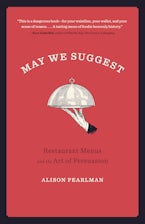
May We Suggest
Restaurant Menus and the Art of Persuasion
Published by: Agate Publishing
280 Pages
- Paperback
- 9781572842601
- Published: October 2018
We’ve all ordered from a restaurant menu. But have you ever wondered to what extent the menu is ordering you?
In this fascinating new book, art historian and food lover Alison Pearlman takes an inquiring look at the design of physical restaurant menus—their content, size, scope, material, and more—to explore how they influence our dining experiences and choices (if they do at all).
After years of collecting menus and studying their cultural significance through the lens of art history, Pearlman realized they were also profoundly important sales tools, affecting everything from a restaurant’s operations and profits to a diner’s expectations and behavior.
There was just one problem: she wasn’t exactly convinced that any menu had ever swayed her own choices. So she set off on a mission to understand if, how, and when menus work in appealing to us diners, visiting and meticulously documenting more than 60 restaurants of all stripes in the greater Los Angeles area.
In May We Suggest, Pearlman combines her own dining experiences with research from a broad range of disciplines, from experience design to behavioral economics. What emerges is a captivating, thought-provoking study of one of the most often read but rarely analyzed narrative works around: the humble menu.
In this fascinating new book, art historian and food lover Alison Pearlman takes an inquiring look at the design of physical restaurant menus—their content, size, scope, material, and more—to explore how they influence our dining experiences and choices (if they do at all).
After years of collecting menus and studying their cultural significance through the lens of art history, Pearlman realized they were also profoundly important sales tools, affecting everything from a restaurant’s operations and profits to a diner’s expectations and behavior.
There was just one problem: she wasn’t exactly convinced that any menu had ever swayed her own choices. So she set off on a mission to understand if, how, and when menus work in appealing to us diners, visiting and meticulously documenting more than 60 restaurants of all stripes in the greater Los Angeles area.
In May We Suggest, Pearlman combines her own dining experiences with research from a broad range of disciplines, from experience design to behavioral economics. What emerges is a captivating, thought-provoking study of one of the most often read but rarely analyzed narrative works around: the humble menu.
